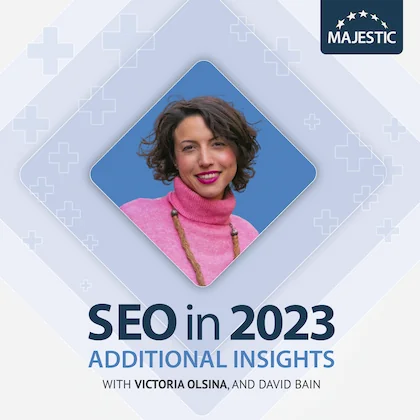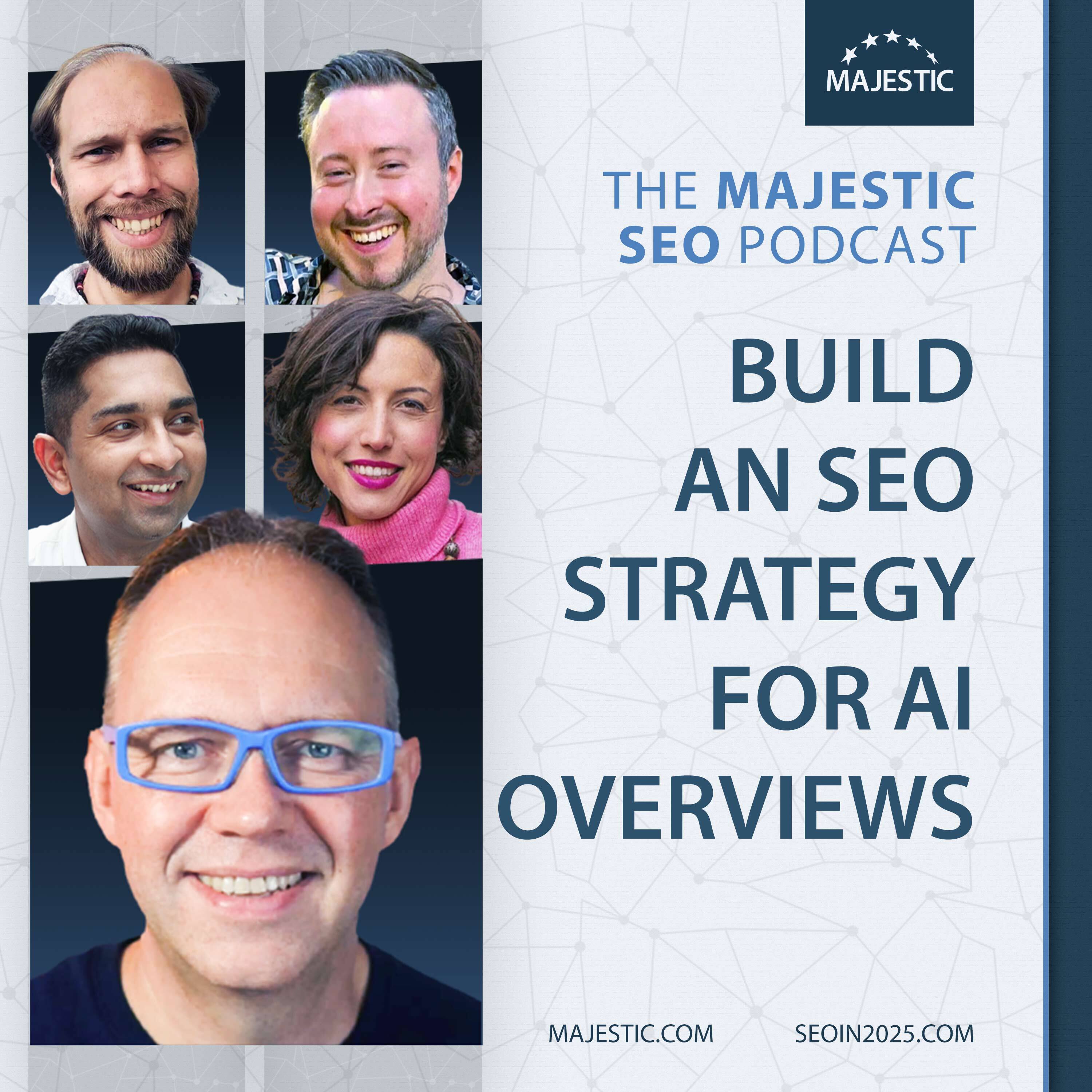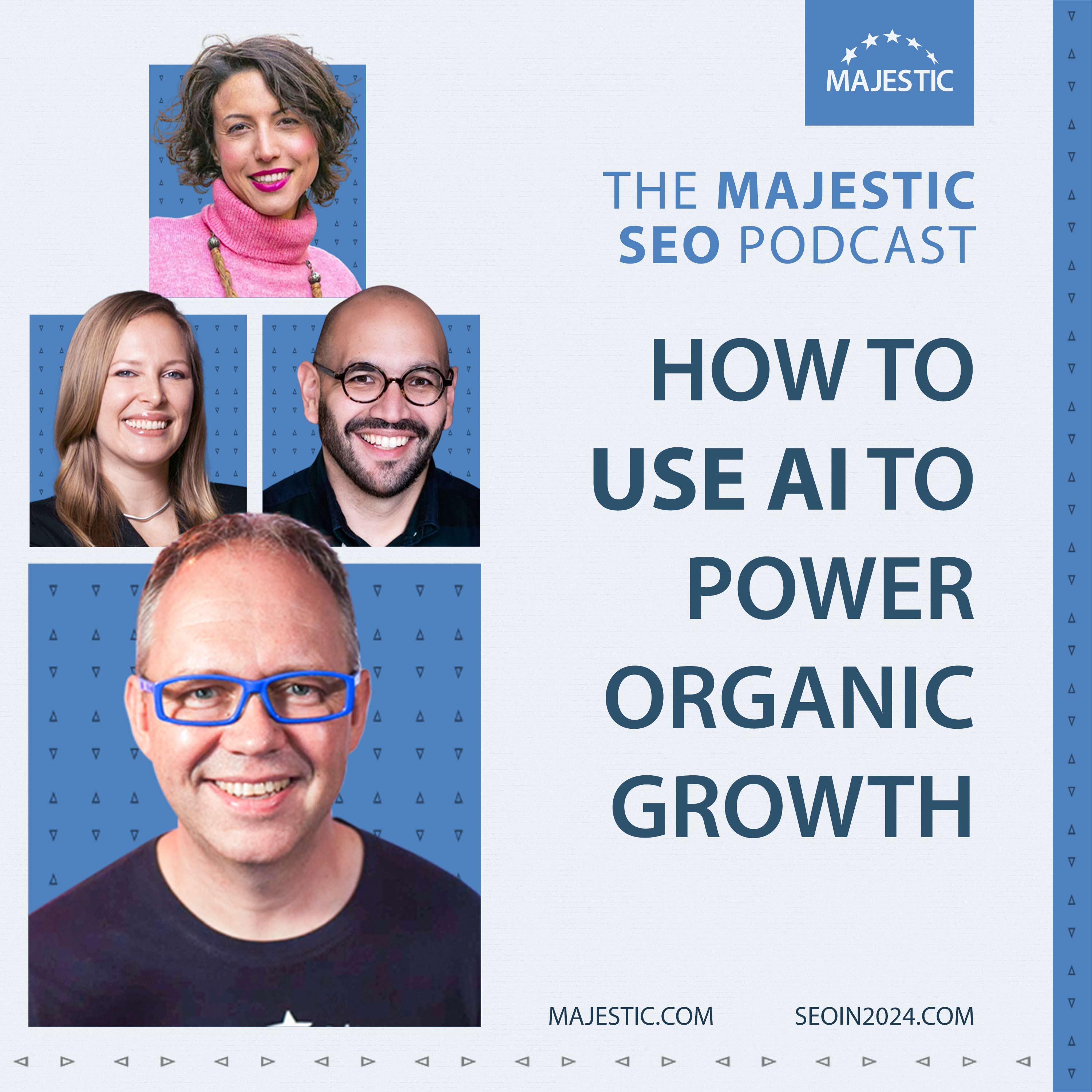-
Site Explorer
- Majestic
- Summary
- Ref Domains
- Backlinks
 New
New Lost
Lost- Context
- Anchor Text
- Pages
- Topics
- Link Graph
- Related Sites
- Advanced Tools
- Author ExplorerBeta
- Summary
- Similar Profiles
- Profile Backlinks
- Attributions
- Compare
-
Link Tools
- My Majestic
- Recent Activity
- Reports
- Campaigns
- Verified Domains
- OpenApps
- API Keys
- Keywords
- Keyword Generator
- Keyword Checker
- Search Explorer
- Link Tools
- Bulk Backlinks
- Neighbourhood Checker
- Submit URLs
- Experimental
- Index Merger
- Link Profile Fight
- Mutual Links
- Solo Links
- PDF Report
- Typo Domain
- Free SEO Tools
- Support
The importance of using hybrid models for AI
Victoria Olsina
Victoria Olsina explores a ‘hybrid model’ approach to AI which combines AI and human expertise to improve content writing and SEO.

Victoria Olsina says “Today I'm going to be talking about AI and how to use it correctly for SEO.”
I know that you love a phrase called 'hybrid models for AI'. So what is a hybrid model?
“A hybrid model is when you use AI to make you a better writer, a better SEO, and even a better human. I think the best way to use AI is when you are assisted by ChatGPT or whichever platform you use, and you use your own keyword research, your own competitor research, and you work with a powerful prompt.
A powerful prompt has to identify the target audience, what is the final content piece going to be used for, who are you and what is your point of view on your particular topic, and then finally produce a draft piece of that content.
Once you have that we can refine and optimise it until it's in a proper shape and form, then we can have a human review the piece and fact check it. This is incredibly important, because we know that sometimes AI provides fake information and makes up facts, which is something that you don't want in a piece that could be informative for your audience. You want to have the actual information and stats, and you can actually take stats from other AI platforms, for example, one that I use is Google Scholar, and we take data stats from there and complement with AI.
Finally, after a human has checked and reviewed the piece, we can publish it. So it's both the best of both worlds, you have AI doing its thing and then humans doing their things as well.”
So there are obviously many different SEO tasks involved in that process. You're talking about everything from research through to publishing content. So looking at keyword research specifically, how do you use AI to help determine keywords and topics, and what should humans do specifically in relation to that task?
“The way I approach it is I select the seed keywords, and the strategy behind those keywords. The selection of seed keywords is done by me, a human, and then I use AI to cluster topics and to calculate the opportunities of each of those clusters.
I was checking the latest version of the GPT-4 the other week, and you can upload CSV files natively, which you could do before with plugins, but now you can do it natively with the new version. And it has provided some very good insights. Also, with the new version, you can make graphs of data and of insights, and I that's one of the things that I have been using AI the most for: data insights and data analysis.”
When you are using GPT-4, what kind of prompts do you use in order to get it to cluster your topics?
“Actually the prompt I use is very simple: Act like an SEO specialist and give me semantically related groups of keywords.”
Act like an SEO specialist and give me semantically linked groups of keywords. So you're looking for ChatGPT to act like an SEO?
“We want prompts to be refined and specific, so getting ChatGPT to 'Act Like' is one of the easiest ways to tell ChatGPT what do you want from the outcome? So you need to specify the role of the AI and then say to act like it, for example, act like an SEO expert, act like a stand-up comedian, act like a nutritionist, etc”
Hopefully not at the same time?
“Maybe, all at the same time. Actually, it’s better, for example, to say to act like a specific person, so instead of ‘act like a stand-up comedian’, it's ‘act like Dave Chappelle’, because ChatGPT already has some information about who he is and what kind of jokes he might make.”
Is there an SEO famous enough that you can go to ChatGPT, act like this SEO?
“I imagined that maybe ‘act like Aleyda Solis’ could work. We don't have so many famous people, but I think that at least saying act like an SEO specialist or act like a salesman is good enough. The other day, I wrote some outreach email saying act like a sales specialist, which I took it from a Facebook group, and it says write like David Ogilvy.”
Okay, so you've got GPT4 to come up with your topic clusters. What's the next stage after that? How do you create the content from the topic clusters, and what role does AI have in that?
“From the topic clusters I might have some ideas as to how to approach the content, because obviously that content could be a product, a service, a blog, a podcast, etc, it could be many things. It's important for me to define the funnel, and for each topic cluster, where they should be in that funnel. Is this informational intent or commercial intent?
So once we have the intent, let's say it's informative intent and it will be mostly for the for the blog, then we check the keyword and what is the possible title. If we cannot come up with a possible title, we can get AI to suggest one, so this is going to be a blog post, this is the informative intent, suggest some titles for this blog post.”
Just to clarify, do you get GPT-4 to come up with the intent for you as well?
“Most of the time, yeah, ChatGPT will do the intent for me. I’ll always review this, because sometimes we know that AI makes mistakes, but even when you have the intent on SEO tools, many times I don't agree with that intent. They use AI well to classify, or at least use machine learning to classify all of these keywords, and sometimes I don't agree on the intent. So I always check what they say, but ultimately, I do my own thing and use what my brain tells me is the most accurate intent.
Then for page titles, again, it will be human made, or AI made. I'm not a native English speaker, so everything that has to do with the language is very important for me. I use it all the time to refine my emails to sound politer, more enthusiastic, and sound like I'm not myself, because I write in a very direct way which comes across very urgent, and sometimes that can come across as rude.”
If you've already published hundreds of articles in a certain tone in your own style, is it possible to get AI to replicate your existing style?
“Yeah, you can train AI, and this is something that we do in my consultancy, particularly for product and service pages. People want product and service pages written in a certain style, a certain tone for your brand, and I think that becomes more real on product and services than on blogs. Blogs are written or at least with the clients that I have, in a more generic way, and products or services have to sound a certain way.
So what you can do is to train the AI with some of your existing articles, not all of them, but maybe three or four. This is related to what I previously said about refining the prompt. I think that a good prompt has examples of what you think is correct in the tone of voice, in the style, and how the final output should look like.
For clients I will build prompt libraries where there are examples of what they have written before (by humans), and how this fits in with new AI content.”
Is there anything AI can't do at the moment in terms of content and writing style? For instance, if it's produced a piece of content for you, do you add elements to that piece of content that only humans can do?
“We generally write elements, because as I said, there is a ‘made-up’ issue that can come across very, very strongly, so it has to be reviewed by a human so that it doesn't say not only incorrect things, but incorrect from a factual point of view.
I'm writing a blog about nutrition with my brother who is a nutritionist, and he's the one that is checking all of the content and sometimes he sends me snippets that makes absolutely no sense. So not only the fact that AI invents and makes things up, but also snippets where AI is writing like somebody on LSD writing about muscles. Some bits are unbelievable, some metaphors are unbelievable, but that's good, because we have someone who is an expert in his field, checking not only the syntaxes, but also the facts that the AI is providing.
He also complements the material with quotes from perplexity.ai, which is nice for research because it quotes a lot of papers and scientific research for you. So let's say we were talking about vitamin A, we can go to perplexity (or a similar tool) and we can see what is the main research that will help to make this article relevant. It's always good to add external links to relevant sources, such as scientific research.
But there are also things that I think AI is not so good at. As you know, I'm also a comedian, and I think that AI is good to enunciate or to refine some jokes, but it can start something and it cannot finish something, and stand-up especially is very precise. A punchline is a punchline, and I don't think that AI can write punchlines yet. Maybe next week, because things are going at a speed that is really, really fast. But right now, no, it can’t.”
It feels like you've articulated that the phase that AI is in at the moment is very much an ‘in-between phase’, and that we've come from humans doing everything to AI doing a lot of the grunt work, to at some point in the future AI creating almost everything in terms of the written form online. It's hard to forecast, but can you envisage a stage in a year's time where your process is going to be completely different, and AI is just going to be producing your content for you?
“It has already changed from one year to the other. Last year in July, I had to hire a junior writer. But now I don't need a junior writer, I need a senior writer. Because 80% of what the junior does is 60-80% of the work that can now be done by AI. I think that people that can think of strategy and are very skilled at their work will continue to have a job. But people who are starting their career that are not so good or they don't have that strategic thinking yet, because you generally do that when you when you move up, will struggle. I think that unless you have been working in a field for a couple of years, then people will find some serious issues with employability or their job will be mostly copying and pasting.”
If someone's maybe starting off as a junior creative SEO or writer, it's a challenging time for them, so do you have any advice to offer them in terms of what direction to go down?
“I think I'm a bit bad at giving career advice because I'm not very ‘corporate’ and when people talk about careers they want something that is really structured, especially when you are starting out. I have always done my own thing. But if I had to give advice to people that are starting out, I would say again to try to cultivate a strategic thinking and not just writing blog posts. Look at how a blog post fits into a wider strategy, and whether that strategy has to have video or has to have a social media component.
That's the way I'm producing content at the moment. I'm not just producing blog posts about the topic for my personal social media posts and then blog posts, video, and repurposing all of this content into all of the other different social media channels into different into small tweet threads in graphics from to put on Instagram, shorts to put on YouTube shorts and Instagram again, TikTok. You need to ask how this fits into a wider strategy?
I think that the people who can do that are the best people, because they are not going to be limited by execution. That's one of the problems that I have. I'm very good at thinking of ideas. I’ve never asked AI to give me ideas. I have a lot of ideas. But my problem is this idea, these three bullet points, I can put them into a script for a video, for a podcast, for a blog post, and then cut my videos or using video AI and then schedule this for every single social media I'm on…. Those things now are quite easy to do, and it will get easier and easier and easier. So if you're an executioner, and your skill is video editing and we have an AI which is doing 60 to 80% of the job? Well, that's an issue.”
I think what you what you started off with these, to cultivate strategic thinking is great advice. So you’ve shared what SEOs should be doing in 2023, now let's talk about what SEOs shouldn't be doing. What's something that's seductive in terms of time, but ultimately counterproductive? What's something that SEOs shouldn't be doing in 2023?
“What SEOs shouldn't be doing in 2023 is not keeping up with everything that is happening every day. There's something new all the time and it's very hard to keep up. But if you don't, then I think that one week is really different from the other.
Last week, for example, I wasn't using the new GPT-4. But now I’ve realised I can improve my workflow and save 90% of my time. If I can do that next week, and there's something I can save 90% of the time in, that's worth it. It's worth the two hours a day I use to keep up with different SEO chat groups, Facebook groups, videos on YouTube, etc. It takes a lot of time, but if I'm saving time by the end of the day, and I can charge for the time that I'm not spending doing it, then I think that's very good.”
Victoria Olsina is an SEO consultant specialising in blockchain, cryptocurrencies and fintech, and you can find her over at victoriaolsina.com.
Also with Victoria Olsina
Choose Your Own Learning Style
 Video
Video
If you like to get up-close with your favourite SEO experts, these one-to-one interviews might just be for you.
Watch all of our episodes, FREE, on our dedicated SEO in 2023: Additional Insights playlist.
 Podcast
Podcast
Maybe you are more of a listener than a watcher, or prefer to learn while you commute.
SEO in 2023: Additional Insights is available now via all the usual podcast platforms
 SEO in 2023
SEO in 2023
Catch up on SEO tips from 101 SEO experts in the original SEO in 2023 series
Available as a video series, podcast, and a book.
Could we improve this page for you? Please tell us








